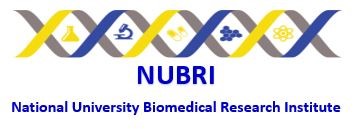Postgraduate Programs
Advance your career with our specialized postgraduate programs in bioinformatics and molecular genetics.
Our Academic Programs
NUBRI offers comprehensive postgraduate programs designed to equip students with the knowledge and skills needed for careers in bioinformatics and related fields.
Master of Bioinformatics

The bioinformatics master's degree program was established in 2019 and is offered over 12 months. It incorporates 13 coursework modules and a research project running concurrently throughout the program. The first batch graduated with 28 students, the second batch (25 students) is in its final semester, and batch three is in the registration process.
This master's degree program equips students with:
- A basic background in modern biology, biochemistry, cell biology, genetics, and molecular biology.
- Familiarity with computational methods to address problems of digital technology in molecular biology.
- Knowledge on storage, retrieval, sharing, and use of biological information in core areas of bioinformatics: multiple sequence alignment, phylogenetic trees, genomics, and proteomics.
- Skills in applied bioinformatics: immunoinformatics, drug designing, and discovery.
The program's courses start with introductory programming and molecular biology before moving on to more advanced topics. Coursework and research are evenly divided. Coursework includes modules in mathematics, statistics, computer science, and biology, with an emphasis on bioinformatics applications. The institute recruits students from diverse backgrounds to enhance collaboration and learning. International experts are invited to deliver workshops to keep students up-to-date with the latest bioinformatics tools and software for big data analysis.
Upon successful completion of the program, graduates will be able to:
- Outline strategies and apply appropriate tools in bioinformatics.
- Identify potential bioinformatics applications drawn from ongoing research.
- Interpret data related to sequences of nucleotides and amino acids, protein domains, and protein structures.
- Develop and implement tools for efficient data access and management.
- Acquire essential programming skills.
- Demonstrate an understanding of algorithms used in bioinformatics.
- Provide bioinformatics knowledge for interpreting rapidly expanding biological information.
- Impart basic bioinformatics concepts to identify, seek, establish, maintain, and exchange research information in biology.
- Provide a strong background in modern biology, biochemistry, cell biology, genetics, and molecular biology.
- Teach computational methods for solving molecular biology problems.
- Provide knowledge on storage, retrieval, sharing, and use of biological data in multiple sequence alignment, phylogenetic trees, genomics, and proteomics.
- Develop skills in applied bioinformatics, including immunoinformatics, drug design, and discovery.
Graduates should be able to:
- Identify strategies and apply bioinformatics tools.
- Recognize topical research problems and their applications.
- Interpret nucleotide and amino acid sequences, protein domains, and protein structures.
- Develop and implement tools for data access and management.
- Acquire programming skills.
- Understand bioinformatics algorithms.
Applicants must meet the regulations set by the College of Graduate Studies and Scientific Research of the National University–Sudan. They must hold an honors B.Sc. from a recognized university in one of the following fields: science, biotechnology, agriculture, medicine, veterinary science, pharmacy, medical laboratory sciences, or dentistry.
Career OpportunitiesGraduates of the MSc in Bioinformatics can:
- Pursue a PhD program.
- Work in research institutions (public or private) or universities.
Postgraduate Diploma in Bioinformatics

Bioinformatics is a benchmark platform bringing together the fields of life science, computer science, and statistics to promote knowledge and technology transfer in molecular genetics, proteomics, and genomics.
It involves the collection, classification, storage, and analysis of biochemical and biological information sets using computer software. One of the basic operations in bioinformatics is searching for similarities or homologies between newly sequenced DNA segments from various organisms. Such operations require combined skills in biology and information technology to collect and analyze data related to genetic mapping.
Bridge the gap in bioinformatics-trained manpower to provide services to industry, research, and academic institutions.
Equip graduates with skills for gene and protein sequence analysis, secondary structure prediction, protein 3D structure modeling, evolutionary studies using phylogenetic algorithms, protein–protein interaction, and protein–ligand docking.
Introduce students to the interdisciplinary nature of bioinformatics, computational biology, and the storage/retrieval of biological databases.
Enable students to:
- Understand algorithms for pairwise and multiple sequence alignment and scoring schemes.
- Develop expertise in bioinformatics relevant to industry and academia.
- Understand molecular modeling and drug design.
- Gain experience in both dry lab and wet lab experiments.
Upon completion, graduates will be able to:
- Identify the structural organization of genes and control of gene expression.
- Understand the mechanisms of genomics and proteomics.
- Analyze complex protein samples and proteomic interactions in complex diseases.
- Interpret biological information computationally.
- Analyze genomic data.
- Apply functional genomics techniques to analyze biological system data.
- Master applications of sequencing technologies.
Applicants must meet the Faculty of Graduate Studies and Scientific Research regulations of the National University–Sudan for registration in the Higher Diploma program.
Eligible fields include: science, biochemistry, physics, zoology, botany, chemistry, mathematics, biotechnology, agriculture, medicine, veterinary medicine, pharmacy, medical laboratory sciences, dentistry, information technology, animal sciences, ecology, radiology sciences, health informatics, and computer sciences.
Eligible candidates are holders of:
- B.Sc. (General) with at least a "Good" grade.
- B.Sc. (General) Third Class with "Pass" grade, plus completion of 12 qualifying credit hours.
Postgraduate Diploma in Molecular Genetics

Molecular genetics, through DNA sequencing and recombinant technologies, plays a pivotal role in understanding the biology of diseases and contributes significantly to their diagnosis, treatment, and prevention. Given its importance, a Higher Diploma in Molecular Genetics serves as a key starting point for candidates involved in medical genetics and related biosciences.
- Provide trained staff in molecular techniques for disease diagnosis and control.
- Equip graduates with scientific competencies to investigate molecular mechanisms involved in the structure and function of living cells.
Provide specialists in molecular biology to:
- Perform multidisciplinary research in genetics, biochemistry, cell biology, medicine, pharmacy, and related fields.
- Handle managerial challenges arising in molecular biology research.
- Participate in international research networks and programs in biochemistry and molecular biology.
Upon completion of the Molecular Genetics Higher Diploma program, graduates will:
- Acquire sound knowledge of the concepts and principles of genetics.
- Be able to describe principles and protocols of various techniques in genetics.
- Apply bioinformatics in the diagnosis and control of diseases.
Applicants must satisfy the regulations of the Ministry of Higher Education and Scientific Research and the general regulations of the Faculty of Graduate Studies and Scientific Research of the National University–Sudan for Higher Diploma registration.
Eligible fields include: science, biochemistry, physics, zoology, botany, chemistry, mathematics, biotechnology, agriculture, medicine, veterinary medicine, pharmacy, medical laboratory sciences, dentistry, information technology, animal sciences, ecology, radiology sciences, health informatics, and computer sciences.
Eligible candidates are holders of:
- B.Sc. (General) with at least a "Good" grade.
- B.Sc. (General) Third Class with "Pass" grade, plus completion of 12 qualifying credit hours.
Admission Requirements
Master of Bioinformatics
- Bachelor's degree in Bioinformatics, Biology, Computer Science, or related field
- Minimum GPA of 3.0 or equivalent
- Basic programming knowledge
- Two letters of recommendation
- Statement of purpose
PGD in Bioinformatics
- Bachelor's degree in any science discipline
- Minimum GPA of 2.5 or equivalent
- Basic computer literacy
- One letter of recommendation
- Statement of interest
PGD in Molecular Genetics
- Bachelor's degree in Biology, Biochemistry, or related field
- Minimum GPA of 2.5 or equivalent
- Basic laboratory experience
- One letter of recommendation
- Statement of interest
Student Testimonials
"The Master of Bioinformatics program at NUBRI provided me with both theoretical knowledge and practical skills that have been invaluable in my career. The faculty are experts in their fields and truly dedicated to student success."
- Ahmed AliMSc Bioinformatics Graduate, 2023
"The PGD in Bioinformatics was the perfect stepping stone for me to transition from traditional biology to computational biology. The program is well-structured and provides excellent hands-on training."
- Sarah MohamedPGD Bioinformatics Graduate, 2024
"As someone with a background in medicine, the PGD in Molecular Genetics opened new doors for me in research and diagnostics. The laboratory facilities at NUBRI are state-of-the-art, and the instructors are very supportive."
- Omar IbrahimPGD Molecular Genetics Graduate, 2023
